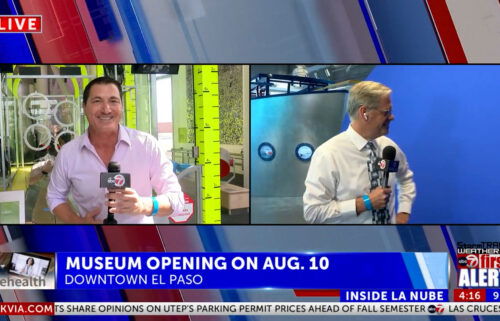New exhibit tells the story of racial lynchings across Missouri
Click here for updates on this story
KANSAS CITY, Missouri (KCTV) — There’s a new exhibit at the Black Archives of Mid-America in Kansas City dedicated to the many lynching victims across the state of Missouri.
Today the group held a memorial ceremony and funeral procession for one of those victims, Levi Harrington, who was lynched in the West Bottoms 139 years ago.
A large mob of white Kansas Citians seized Levi Harrington from Kansas City Police custody on April 3, 1882, and took him to a bridge overlooking the West Bottoms, hung him and shot him. Hundreds gathered to watch the gruesome killing unfold.
Harrington was accused of killing a police officer earlier that day.
“He didn’t do it, he wasn’t even close by. But he was a lone black man, so he got charged with that and they decided to victimize him and make an example out of him. They knew he hadn’t done it,” Carmaletta Williams, Executive Director of the Black Archives of Mid-America said.
The day after Harrington’s lynching, another man was accused of the crime and Harrington was declared innocent. Yet no one was ever held responsible to his murder.
“In fact, as his body hung there, they had target practice and they just shot bullets into his body,” Williams said.
On Saturday community members and leaders gathered where Harrington died to collect a jar of soil from the area where he was lynched. The act represents a reclaiming of the space for the person whose life was stolen.
The soil is now displayed in an exhibit called “The Story is in the Soil” at the Black Archives.
“The room holds really a sacredness about it. Because the even in the spaces where dirt is not yet collected, we know that lynchings took place,” Christine Peoples said.
Peoples is the Community Engagement Coordinator for the Springfield-Greene County Parks Board. She believes spreading awareness about racial lynchings is important.
“Its not about the blame game,” she said. “It’s about asking ‘what can we do now? Where can we make the difference?’”
Most, if not all, of the lynching victims in the new soil exhibit never had a funeral or any sort of justice for what happened to them.
“It was clear that were innocent, but it was too late if you don’t wait for due process,” Peoples said.
Please note: This content carries a strict local market embargo. If you share the same market as the contributor of this article, you may not use it on any platform.




